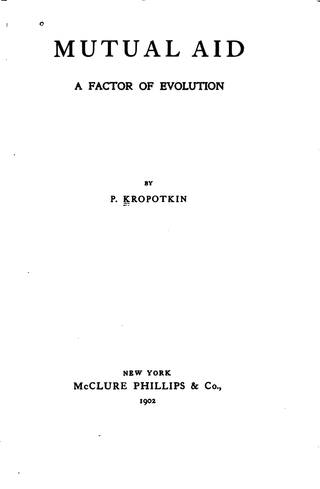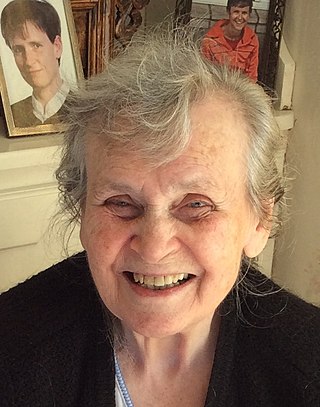Related Research Articles

Biological anthropology, also known as physical anthropology, is a soft science or social science discipline concerned with the biological and behavioral aspects of human beings, their extinct hominin ancestors, and related non-human primates, particularly from an evolutionary perspective. This subfield of anthropology systematically studies human beings from a biological perspective.

Mutual Aid: A Factor of Evolution is a 1902 collection of anthropological essays by Russian naturalist and anarchist philosopher Peter Kropotkin. The essays, initially published in the English periodical The Nineteenth Century between 1890 and 1896, explore the role of mutually beneficial cooperation and reciprocity in the animal kingdom and human societies both past and present. It is an argument against theories of social Darwinism that emphasize competition and survival of the fittest, and against the romantic depictions by writers such as Jean-Jacques Rousseau, who thought that cooperation was motivated by universal love. Instead, Kropotkin argues that mutual aid has pragmatic advantages for the survival of human and animal communities and, along with the conscience, has been promoted through natural selection.

Robin Ian MacDonald Dunbar is a British biological anthropologist, evolutionary psychologist, and specialist in primate behaviour. Dunbar is professor emeritus of evolutionary psychology of the Social and Evolutionary Neuroscience Research Group in the Department of Experimental Psychology at the University of Oxford. He is best known for formulating Dunbar's number, a measurement of the "cognitive limit to the number of individuals with whom any one person can maintain stable relationships".
Fictive kinship is a term used by anthropologists and ethnographers to describe forms of kinship or social ties that are based on neither consanguineal nor affinal ties. It contrasts with true kinship ties.

The grandmother hypothesis is a hypothesis to explain the existence of menopause in human life history by identifying the adaptive value of extended kin networking. It builds on the previously postulated "mother hypothesis" which states that as mothers age, the costs of reproducing become greater, and energy devoted to those activities would be better spent helping her offspring in their reproductive efforts. It suggests that by redirecting their energy onto those of their offspring, grandmothers can better ensure the survival of their genes through younger generations. By providing sustenance and support to their kin, grandmothers not only ensure that their genetic interests are met, but they also enhance their social networks which could translate into better immediate resource acquisition. This effect could extend past kin into larger community networks and benefit wider group fitness.

Robert Andrew Foley, FBA is a British anthropologist, archaeologist, and academic, specialising in human evolution. From 1977 to 1985, he was a lecturer in anthropology at the University of Durham. He has been a fellow of King's College, Cambridge, since 1987, and Leverhulme Professor of Human Evolution at the University of Cambridge since 2003.
Dual inheritance theory (DIT), also known as gene–culture coevolution or biocultural evolution, was developed in the 1960s through early 1980s to explain how human behavior is a product of two different and interacting evolutionary processes: genetic evolution and cultural evolution. Genes and culture continually interact in a feedback loop: changes in genes can lead to changes in culture which can then influence genetic selection, and vice versa. One of the theory's central claims is that culture evolves partly through a Darwinian selection process, which dual inheritance theorists often describe by analogy to genetic evolution.
Sir Paul Anthony Mellars was a British archaeologist and professor of prehistory and human evolution at the University of Cambridge.
Evolutionary Psychology is a peer-reviewed open access academic journal published since 2003. It covers empirical, philosophical, historical, and socio-political aspects of evolutionary psychology. Its editors-in-chief are Todd K. Shackelford, Bernhard Fink, David A. Puts, and Rebecca Sear. In 2015 the journal moved to SAGE Publications.
Helena Francisca Hamerow, is an American archaeologist, best known for her work on the archeology of early medieval communities in Northwestern Europe. She is Professor of Early Medieval archaeology and former Head of the School of Archaeology, University of Oxford.
The concept of nurture kinship in the anthropological study of human social relationships (kinship) highlights the extent to which such relationships are brought into being through the performance of various acts of nurture between individuals. Additionally the concept highlights ethnographic findings that, in a wide swath of human societies, people understand, conceptualize and symbolize their relationships predominantly in terms of giving, receiving and sharing nurture. The concept stands in contrast to the earlier anthropological concepts of human kinship relations being fundamentally based on "blood ties", some other form of shared substance, or a proxy for these, and the accompanying notion that people universally understand their social relationships predominantly in these terms.
Mark David Pagel FRS is an evolutionary biologist and professor. He heads the Evolutionary Biology Group at the University of Reading. He is known for comparative studies in evolutionary biology. In 1994, with his spouse, anthropologist Ruth Mace, Pagel pioneered the Comparative Method in Anthropology.
Ruth Harris is an American historian and academic. She has been Professor of Modern History at the University of Oxford since 2011 and a senior research fellow at All Souls College, Oxford, since 2016. Previously, she was a junior research fellow at St John's College, Oxford, from 1983 to 1987, an associate professor at Smith College from 1987 to 1990, and a fellow of New College, Oxford, between 1990 and 2016. She was awarded the Wolfson History Prize in 2010 for her book The Man on Devil's Island, a biography on Alfred Dreyfus.
Ruth Mace FBA is a British anthropologist, biologist, and academic. She specialises in the evolutionary ecology of human demography and life history, and phylogenetic approaches to culture and language evolution. Since 2004, she has been Professor of Evolutionary Anthropology at University College London.
Wendy Rosalind James, was a British social anthropologist and academic. She was Professor of Social Anthropology at the University of Oxford from 1996 to 2007, and President of the Royal Anthropological Institute from 2001 to 2004.
Emily Marjata Dorothea Grundy, is a British demographer and academic, specialising in ageing and health inequalities. Since 2013, she has been Professor of Demography at the London School of Economics and Political Science (LSE). She was previously Professor of Demographic Gerontology at the London School of Hygiene and Tropical Medicine (LSHTM) from 2003 to 2012, and Professor of Demography at the University of Cambridge from 2012 to 2013. From October 2017, she will be Professor of Population Science and Director of the Institute for Social and Economic Research at the University of Essex.
Laura Fortunato is an evolutionary anthropologist whose research investigates the evolution of human social and cultural behavior. She investigates topics such as the evolution of kinship and marriage systems, social complexity and culture. She is Professor of Evolutionary Anthropology at the University of Oxford.
Allomothering, or allomaternal care, is parental care provided by group members other than the genetic mother. This is a common feature of many cooperative breeding species, including some mammal, bird and insect species. Allomothering in humans is universal, but the members who participate in allomothering vary from culture to culture. Common allomothers are grandmothers, older siblings, extended family members, members of religious communities and ritual kin.

Ruth Hilary Finnegan is a Northern Irish linguistic anthropologist and Emeritus Professor of the Open University.
Few animals have a menopause: humans are joined by just four other species in which females live substantially longer than their ability to reproduce. The others are all cetaceans: beluga whales, narwhals, orcas and short-finned pilot whales. There are various theories on the origin and process of the evolution of menopause. These attempt to suggest evolutionary benefits to the human species stemming from the cessation of women's reproductive capability before the end of their natural lifespan. Explanations can be categorized as adaptive and non-adaptive:
References
- ↑ "Professor Rebecca Sear FBA". The British Academy. 2024. Retrieved 6 September 2024.
- ↑ "Spotlight on… Rebecca Sear". www.lshtm.ac.uk. London School of Hygiene & Tropical Medicine. 4 September 2023. Retrieved 6 September 2024.
- ↑ "Dr Rebecca Sear". Brunel University London. Retrieved 6 September 2024.
- 1 2 "Professor Rebecca Sear" (pdf). International Union for the Scientific Study of Population. August 2021. Retrieved 6 September 2024.
- ↑ Sear, Rebecca Susan (2001). Evolutionary demography of a rural Gambian population (PhD thesis). University College London. Retrieved 6 September 2024.
- ↑ "The British Academy welcomes 86 new Fellows in 2024". thebritishacademy.ac.uk. The British Academy. 18 July 2024. Retrieved 6 September 2024.